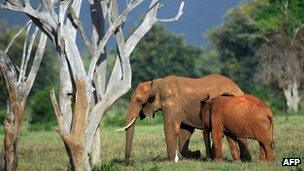WWF: Asia fuels illegal wildlife parts trade
- Published

WWF says ivory from 2,500 elephants was seized in 2011
Vietnam, Laos and Mozambique have been ranked lowest in a report focusing on the illegal rhino horn, ivory and tiger-part trade.
The report by conservation group WWF scored 23 countries "facing high levels of poaching and trafficking" of these items.
Vietnam was the "top destination for rhino horn", fuelling a poaching crisis in South Africa, the report said.
Laos and Mozambique failed on ivory trade compliance and enforcement.
WWF describes the 23 countries assessed as "top-range transit and destination countries implicated in illegal trade of elephant, rhino and tiger products".
<link> <caption>The report</caption> <url href="http://awsassets.panda.org/downloads/wwf_wildlife_crime_scorecard_report.pdf" platform="highweb"/> </link> rated countries for each animal, saying "the scorecard seeks to differentiate between countries where it is actively being countered from those where current efforts are entirely inadequate".
Among destination countries, Vietnam failed on "key aspects of compliance and enforcement" for the rhino and the tiger-part trades.
"It is time for Vietnam to face the fact that its illegal consumption of rhino horn is driving the widespread poaching of endangered rhinos in Africa, and that it must crack down on the illegal rhino horn trade," Elisabeth McLellan, WWF Global Species Programme manager, <link> <caption>said in a statement</caption> <url href="http://wwf.panda.org/who_we_are/wwf_offices/wwf_offices_asia.cfm?205728/Countries-fail-to-protect-endangered-species-from-illegal-trade" platform="highweb"/> </link> .
Vietnam's decision in 2007 to establish "pilot breeding farms" for tigers had "undermined" its efforts in the illegal trade of tiger products, the report also said.
As for those classified under origin and transit countries, Mozambique failed on rhinos and elephants, and Laos on tigers and elephants.
The WWF report urged China and Thailand, top destinations for illegal African ivory, to tighten enforcement.
It also commended progress made, even as it added that "major prosecutions for wildlife crime are still rare".
"There were important advances in compliance in 2010-2012, with introduction of stricter legislation, wildlife trade controls and penalties in a number of countries, including China, India, Laos, Malaysia, Nigeria, Russia, South Africa and Zimbabwe," it said.
The three animal species listed have been dwindling in numbers. WWF says that there were 262 South African rhinos poached in the first half of 2012, while ivory from 2,500 elephants was seized in 2011.
- Published22 July 2012
- Published20 July 2012
- Published27 June 2012
- Published12 April 2012
- Published3 November 2011